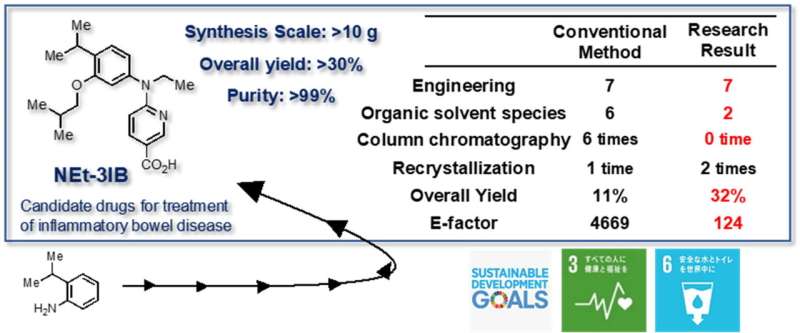Green synthesis of drug candidate for inflammatory bowel disease

Inflammatory bowel disease (IBD), characterized by a chronic inflammation of the digestive tract, is currently treated with steroids and antibody drugs. However, steroids have side effects, such as delayed healing, and antibody drugs are expensive. Small-molecule drugs are both cost-effective and easy to administer. A new small-molecule oral drug is key to achieving the sustainable development goal (SDG) "health and well-being for all."
To this end, a research team led by Associate Professor Hiroki Kakuta from Okayama University, Japan, have developed a new large-scale synthesis method for widespread and stable supply of 4-(ethyl(3-isobutoxy-4-isopropylphenyl)amino)benzoic acid or NEt-3IB, a promising drug candidate for IBD. The research team further consisted of Yuta Takemura, Ken-ichi Morishita, Shota Kikuzawa, and Masaki Watanabe, all from Okayama University. Their findings have been published in Chemical and Pharmaceutical Bulletin. The paper was made available online on February 1, 2022 and was published in Volume 70 Issue 2 of the journal.
"We have successfully developed a new method for mass-synthesizing environmentally friendly NEt-3IB with a 35-fold better E-factor—an indicator of the environmental burden in multistage drug substance synthesis—than conventional processes," says Dr. Kakuta.
Describing the motivation behind their study, Dr. Kakuta explains, "The synthesis of NEt-3IB conventionally uses column chromatography, which requires a large amount of organic solvents in addition to three organic solvents that are not recoverable for reaction. In order to achieve carbon neutrality and meet sustainable development goals (SDGs), we were driven to avoid column chromatography and find approaches with recoverable organic solvents."
With this in mind, the research team studied the existing chemical synthesis methods and developed a new process that uses only a fat-soluble ether and alcohol. This modification drastically reduced the volume of liquid waste and also allowed it to be easily recycled. Purification of the resultant NEt-3IB by recrystallization confirmed that this new synthesis method was capable of supplying large quantities of NEt-3IB with a total yield of more than 30% and a purity of 99%.
"Our method provides an example of an approach that employs recoverable solvents and takes a step towards carbon neutrality. This approach can be applied for the production of not only NEt-3IB, but also other small molecule pharmaceuticals," adds Dr. Kakuta.
On a related note, the contamination of reaction kilns, or "batches," by foreign substances has led to plenty of drug recalls worldwide during recent times. This has sparked global curiosity and a paradigm shift from batch synthesis to flow synthesis. The large-scale flow synthesis method for NEt-3IB reported in this study involves a simple purification step and reduces the number of organic solvent species used during the entire process.
Owing to these distinct benefits, the newly devised method is expected to provide a stepping stone for the complete continuous-flow synthesis of active pharmaceutical ingredients, popularly known as APIs. Dr. Kakuta explains, "We are going to launch clinical trials this year using NEt-3IB synthesized via the environmentally-friendly method. We hope to find a new treatment for IBD within a few years."
More information: Yuta Takamura et al, Development of Scaled-Up Synthetic Method for Retinoid X Receptor Agonist NEt-3IB Contributing to Sustainable Development Goals, Chemical and Pharmaceutical Bulletin (2022). DOI: 10.1248/cpb.c21-00911




















